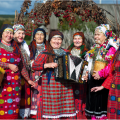Trad.Attack! is one of Estonia’s most popular contemporary bands. Blending folk, rock, and traditional Estonian melodies, they’ve toured the world, expanding the reach of Estonian music. According to their website, “Trad.Attack! has really turned the Estonian music scene upside down by bringing traditional music to the big stages, building a modern world around its archaic sounds.”
The band was created in 2014 by Sandra Vabarna, Jalmar Vabarna, and Tõnu Tubli, all three of whom had been members of the Estonian music scene for years already. Sandra, a folk musician who plays the Estonian bagpipes and other wind instruments, is the band’s leader. Jalmar is the singer; he was raised in the Seto singing tradition (Seto is a small ethnic group in southeastern Estonian with its own language and distinct culture). He also plays string instruments. Tõnu plays brass instruments and the drums, and has been the drummer for many well-known Estonian bands. Many of their songs draw on old Estonian folk recordings, or even use the recordings in the songs themselves.
When they started the band, the three members planned only to experiment and play around with folk music—they didn’t really expect to play concerts, much less become one of Estonia’s most popular bands. They have since won a number of prestigious awards, including Best Band from the Estonian Music Awards in 2016 and Best Band from the Estonian Ethno Music Awards in 2015 and 2014. They have released four albums, the most recent in 2017.
“Cream” (“Kooreke”), the band’s first single and first hit:
Lyrics for “Kooreke”:
Kooreke,
midadi-mädadi, männake!
Kibadi-kobadi kokku mingu,
midadi-mädadi mättad tulgu,
taevast tulgu, sisse mingu,
ümmer männa mitsa-matsa,
leiva peale litsa-latsa,
ah, ah, ah, ah!
Lastel lõbus tantsu lüia,
võid ja pehmet leiba süia,
ah, ah, ah, ah!
“Jaan’kene,” 2016:
Lyrics for “Jaan’kene”:
Jaan ́kõnõ, saan ́kõnõ,
Tii’ till ́o riikene,
üle mere minnä’-tulla’, takast
Narva naista võtta’.
Mul om naane noorõkõnõ,
Rõõsa piimä koorõkõnõ.
Täämbä omma’ iks suurõ’
saaja’ ülehummõn väiko’ saaja’.











